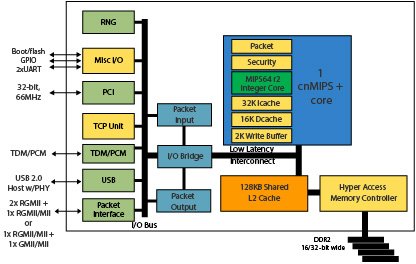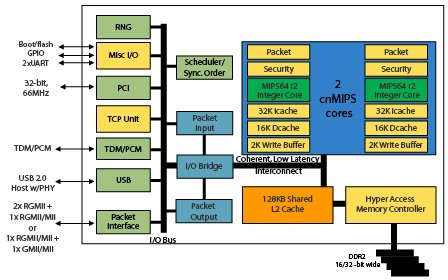Linux runs xPON/FTTx gateway SoCs
Oct 8, 2007 — by LinuxDevices Staff — from the LinuxDevices Archive — 62 viewsFabless chipmaker Cavium is readying a pair of low-power networking SoCs (system-on-chip processors) targeting passive optical networking and fiber-to-the-home/office (“xPON/FTTx) gateway devices. The single-core CN5010 and dual-core CN5020 will sample in Q4, while Linux development kits and simulators are on demo at the Broadband World Forum in Berlin this week.
Cavium claims its new CN50xx chips to be pin- and software-compatible with its currently available CN30xx line of gateway SoCs, while doubling performance and halving power requirements. In addition to xPON/FTTx gateway devices such as triple-play (voice/video/data) service platforms, the SoCs target enterprise routers and switches, UTM (unified threat management) appliances, 802.11n WLAN access points, VoIP gateways, control-plane cards, internet cafe routers, IP set-top boxes, and broadband access equipment, according to the silicon vendor
Cavium claims the CN50xx chips to be capable of IP forwarding and NAT (network address translation) at 2Gbps, or 1Gbps with VPN (virtual private networking) encryption. NAS (network-attached storage) throughputs up to 40MBps are claimed possible, as are 802.11n throughputs in excess of 350Mbps.
The CN50xx SoCs are based on one or two of Cavium's 64-bit cnMIPS cores, clocked from 300MHz to 700MHz. The cores integrate 128KB of L2 cache, and a DDR2 memory controller.


Octeon CN5010 (upper) and CN5020 (lower) SoC diagrams
(Click each diagram to enlarge)
Also present are hardware engines for packet, TCP, security, and QoS (quality-of-service) processing, with cryptographic acceleration hardware optional. On-chip peripheral interfaces include USB 2.0, three gigabit Ethernet interfaces, and a TDM/PCM (time-division-multiplexed / pulse-code-modulated) bus interface for connecting analog telephones. There's also a PCI expansion interface.
The CN50xx chips will be supplied with a Linux SDK (software development kit) based on SMP Linux 2.6, GNU tools, co-processor acceleration APIs, and “reference software for a range of wired and wireless networking, storage, and service provider applications,” the Cavium said. Additionally, the company claims its processors are supported by third-party software and silicon partners that include Arada Systems (story), D2 Tech, Entropic, Jungo, Kaspersky, and Teknovus.
“Increasing line rates and multi-function integration along with security processing are driving the need for QoS, packet processing, and security in hardware,” said Linley Group analyst Linley Gwennap in a statement released by Cavium.
Availability
Octeon CN50xx processors and boards are expected to sample in Q4. Meanwhile, the Linux SDK with simulator is available now to partner companies, according to Cavium.
This article was originally published on LinuxDevices.com and has been donated to the open source community by QuinStreet Inc. Please visit LinuxToday.com for up-to-date news and articles about Linux and open source.